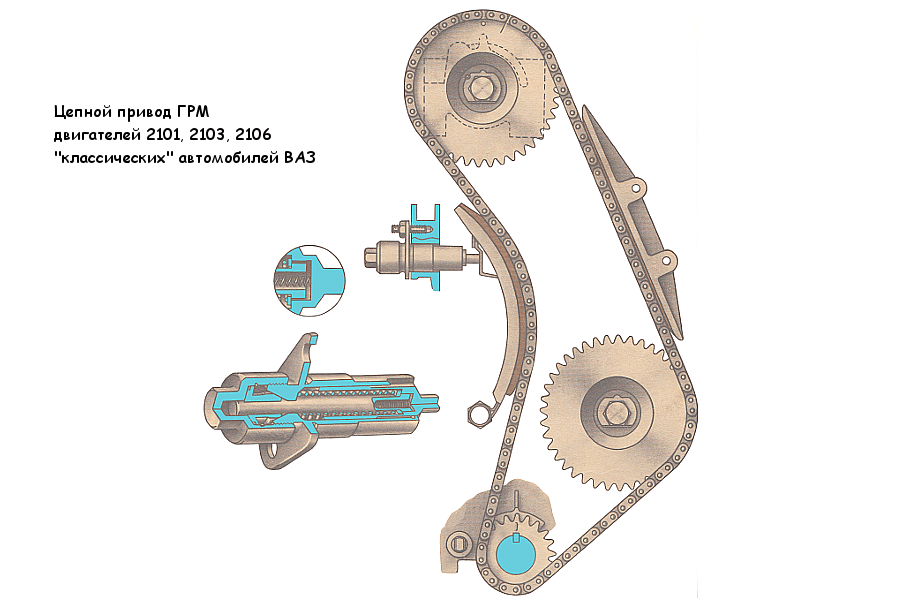
Symptoms of a Faulty or Faulty Timing Chain
Content
Common signs of a bad timing chain include engine misfiring, metal shavings in the oil, and engine rattling at idle.
Since the advent of the internal combustion engine, one constant has remained - they all have a timing chain or timing belt. Most large displacement engines have a timing chain rather than a timing belt. The chain is located at the front of the engine and is attached to a set of gears and pulleys that drive several mechanical components, including the crankshaft and camshaft. In order for your engine to start, the timing chain must rotate smoothly around the gears without hesitation. Although the timing chain is made of metal, it is subject to wear and can break if not replaced according to the manufacturer's recommendations.
A timing chain is made up of a series of chain links similar to those found on a bicycle chain. The links run on toothed sprockets located at the ends of the crankshaft and camshaft, which are responsible for opening and closing valves in the cylinder head and moving pistons and connecting rods in the combustion chamber. The timing chain can stretch and wear over time, resulting in inaccurate engine timings and multiple warning signs.
Listed below are 5 signs of a worn timing chain. If you notice any of these warning signs, it's a good idea to contact your local mechanic as soon as possible to determine the exact cause and make appropriate repairs if necessary.
1. Engine misfiring or running poorly
There are two ways to achieve valve timing in an internal combustion engine. The first is the two-stage method, which involves direct connection of the crankshaft to the camshaft gear. This method is used in most types of heavy equipment and large trucks. The chain timing method is more common in consumer vehicles and high performance engines. Over time, the timing chain can stretch, which can cause a gear to miss on the cam or crankshaft. This results in a miscalibration of the engine timing and often results in a misfire. The engine may also run poorly and lack acceleration power.
If this situation occurs, the timing chain is most likely damaged and needs to be replaced as soon as possible. If the timing chain breaks, loose metal rolling around inside the engine can cause severe engine damage.
All car manufacturers recommend changing the engine oil and filter every 3,000 to 5,000 miles. Over time, the oil begins to separate as it heats up and is exposed to the natural solvents found in gasoline. If the timing chain begins to wear out, small metal pieces can break off the chain and enter the oil pan. When you're changing your oil and the mechanic tells you that there were little bits of metal in the drained oil or filter, that's a good sign that your timing chain is starting to fail.
Metal chips are also often seen with severe wear on cylinder head valves, holders, retainers and other cylinder head hardware. It is imperative that a mechanic or technician check the problem and make appropriate repairs as soon as possible.
3. Engine does not start or does not run
An open timing chain will cause the engine to not start or fail while driving. If the belt has already broken, the engine will not have enough compression to start. If it breaks or bounces while driving, the pistons will be damaged from contact with the valves. The valves themselves will bend and potentially destroy the engine. If the belt is slipping because it is loose, it can also loosen and damage other parts of the engine. If your engine does not start or starts to run rough, indicating that it may be failing, have a certified mechanic check and repair.
4. Check if the engine light is on
The Check Engine light can come on for a variety of reasons, one of which could be a timing chain failure. The car's computer will display warning lights that need to be checked and scanned for trouble codes to determine the source of the problem. The check engine light may come on when the on-board computer detects something wrong with the emissions system and engine operation. A stretched timing chain contributes to reduced engine performance and increased emissions by causing the check engine light to come on and store a DTC. The mechanic will need to check the code and schedule any necessary repairs.
5. Engine rattles at idle
Unusual sounds are also a common warning sign of a problem inside your engine. Under normal conditions, the engine should make a smooth, steady sound indicating that everything is working as it should. However, when the timing chain is loose, it can cause vibration inside the engine, which will cause a rattling sound when the engine is idling. Every time you hear a knock, it means something is loose and needs to be fixed before it breaks.
The timing chain is an integral part of any engine, and without it, your car becomes useless. If the timing chain breaks while driving, serious engine damage to your vehicle could result. The best way to reduce the chance of serious engine damage is to have a professional mechanic replace the timing chain if you notice any of the warning signs listed above. By being proactive and vigilant, you can save thousands of dollars and greatly extend the life of your engine.